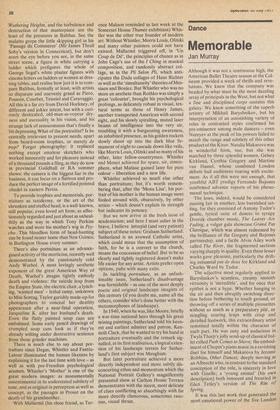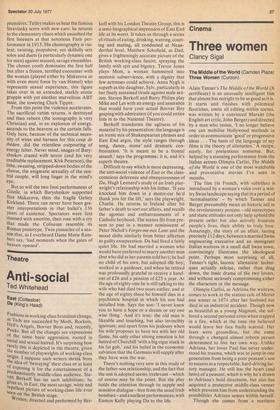Dance
Memorable
Jan Murray
Although it was not a continuous high, the American Ballet Theatre season at the Coliseum provided a week of thrills and revelations. We knew that the company was headed by what must be the most dazzling array of principals in the West, but not what a fine and disciplined corps sustains this galaxy. We knew something of the superb artistry of Mikhail Baryshnikov, but his interpretation of an astonishing variety of roles in contrasted styles confirmed his pre-eminence among male dancers — even Nureyev at the peak of his powers failed to match the range and subtlety of this other product of the Kirov. Natalia Makarova was in wonderful form, too, but she was matched by three splendid women, Gelsey Kirkland, Cynthia Gregory and Martine van Hamel, whose combined London debuts had audiences roaring with excitement. As if all this were not enough, that youthful ABT prodigy Fernando Bujones confirmed advance reports of his phenomenal technique.
The lows, indeed, would be considered passing fair in another, less burnished setting, for they consisted of Antony Tudor's gentle, lyrical suite of dances to syrupy Dvorak chamber music, The Leaves Are Fading, a vulgar gala showcase Grand Pas Classique, which was almost redeemed by the brilliance of the Gregory and Bujones partnership, arid a facile Alvin Ailey work called The River, the fragmented sections varying sharply in quality. Even these lesser works gave pleasure, particularly the drifting autumnal pas de deux for Kirkland and Charles Ward by Tudor.
The adjective most regularly applied to Baryshnikov's seamless, creamy smooth virtuosity is 'incredible', and for once that epithet is not a hype. Whether hanging in the air and then abruptly switching direction before bothering to touch ground, or throwing off a series of multiple pirouettes without so much as a preparatory pile, or mingling soaring leaps with crisp and detailed footwork, this extraordinary artist remained totally within the character of each part. He was zany and audacious in Twyla Tharp's jolly send-up of classical ballet called Push Comes to Shove; the embodiment of Chopin's piano music in a ravishing duet for himself and Makarova by Jerome Robbins, Other Dances; deeply moving as an Albrecht who, in contrast to the standard conception of the role, is sincerely in love with Giselle; a 'young animal' (his own description) both innocent and frenzied iri Glen Tetley's version of The Rite of Spring.
It was this last work that generated the most emotional power of the five London premieres. Tetley makes us hear the famous Stravinsky score with new ears: he returns to the elementary chaos which assaulted the first listeners at that notorious Paris performance in 1913. His choreography is violent, twisting, propulsive, yet skilfully sets solos and duets (a particularly dynamic one for men) against massed, savage ensembles. The chosen youth dominates the first half but after a frozen, terrified encounter with the woman (played either by Makarova or with even more force by van Hamel) who represents sexual experience, this figure takes over in an extended, starkly erotic grapple with yet another marvellous ABT male, the towering Clark Tippet.
From this point the violence accelerates. The sacrificial victim returns, is destroyed and then reborn (the iconography is very Christian) and, in an explosion of energy, ascends to the heavens as the curtain falls. Only here, because of the technical necessity of wires and harness for this coup de ihedtre, did the relentless outpouring of energy falter. Never mind, images of Baryshnikov crazed with terror (and his very creditable replacement, Kirk Peterson), the lithe, sweating, stripped-down bodies of the chorus, the enigmatic sexuality of the central couple, will long linger in the mind's eye.
But so will the two final performances of Giselle, in which Baryshnikov supported first Makarova, then the fragile Gelsey Kirkland. There can never have been greater interpretations in that ballet's 136 years of existence. Spectators were first stunned with emotion, then rose with a cry that made the Coliseum resemble its Roman prototype. Twin pinnacles of a season that, as I overheard Dame Marie Rambert say, had moments when the gates of heaven opened'.



































 Previous page
Previous page